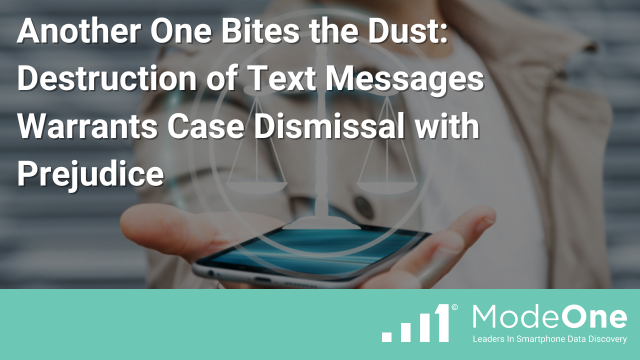Everyone knows the importance of preserving electronically stored information (ESI) in litigation. But not everyone knows that ESI includes text messages and that an effective e-discovery data collection includes the use of advanced smartphone discovery tools sooner rather than later.
An Arizona district court found that a former waitress intentionally deleted relevant text messages and worked with her witnesses to do likewise, depriving her former employer of potential evidence to defend a Title VII lawsuit. The district court dismissed the case with prejudice after finding that the destruction of text messages prejudiced the employer’s ability to go to trial. The United States Court of Appeals for the Ninth Circuit affirmed, finding no abuse of discretion by the trial court. (Jones v. Riot Hosp. Grp. LLC, 2024 WL 927669 (9th Cir. 2024).
A Judge Walks into a Bar …
A former waitress at a Scottsdale bar, Alyssa Jones, sued a bar’s owner-operator and his company, Riot Hospitality Group (“Riot”), alleging Title VII violations and common law tort claims. During discovery, Riot found that Jones abruptly stopped communicating with friends and co-workers whom she messaged almost daily.
The district court allowed Riot to subpoena third-party witnesses to produce their recent communications regarding Jones’ claims and ordered Jones to deliver her phone to Riot’s forensic specialist. After comparing the volume of messages sent and received between the phone pairs, the specialist concluded that “an orchestrated effort to delete and/or hide evidence” had occurred.
Riot moved for terminating sanctions under Federal Rule of Civil Procedure 37(e)(2). The district court agreed, dismissing the case with prejudice, finding that Jones deleted text messages and also cooperated in deleting messages by her witnesses, intending to deprive Riot of their use in litigation.
Ninth Circuit Affirms the Dismissal Sanction
The Ninth Circuit Court of Appeals reviewed the discovery sanctions for abuse of discretion and found none. Rule 37(e) applies when ESI should have been preserved in the anticipation of litigation, but it was lost because a party failed to take reasonable steps to preserve it, and it cannot be restored or replaced through additional discovery. If a district court finds the loss prejudicial, it can order measures “no greater than necessary to cure the prejudice.” But if the court finds the plaintiff acted with the intent to deprive another party of the information to use in litigation, dismissal is warranted.
The district court found that Jones intentionally deleted relevant text messages with co-workers with the intent to deprive Riot of the use of those messages at trial. The court further found that the deleted messages could not be restored or replaced with additional discovery.
The appellate court found that the lower court correctly relied on the finding that intent required by Rule 37(e)(2) can support the inference that the lost information was unfavorable to the party that destroyed it and an inference that the opposing party was prejudiced by the loss of the information that would have favored its position. Hence, the district court was not required to find any further finding to dismiss the case with prejudice.
Litigants should send subpoenas out to third-party witnesses sooner rather than later and assure courts that they can protect the witnesses’ privacy rights to their smartphone data by accessing and transferring only the data authorized by the client.
ModeOne’s SaaS solution enables a technician to define the date ranges and data sources relevant to a matter. The ModeOne framework gains remote access to the smartphone only after receiving the custodian’s advance permission, locates the relevant data stored on the phone, and securely transfers it to ModeOne’s cloud storage where the client can then search and review relevant messages in a threaded format using ModeOne’s web-based user interface and download selected messages in a format compatible with any eDiscovery review platform.
Hat tip to the eDiscovery Today blog for bringing the Jones v. Riot Hosp. Grp. LLC case to our attention and we thank eDiscovery Assistant for providing the link to the case opinion.
